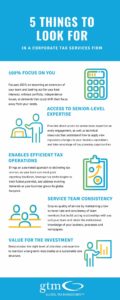Supplement Your Tax Department With Co-sourcing
Even before 2020, the tax world was changing rapidly. COVID-19 has only added to these challenges as tax departments continue struggling to keep up. Accordingly, the corporate tax function has been altered for the foreseeable future based on recent changes, from a new presidential administration to the passage of the CARES Act to a remote workforce to the release of new regulations/interpretations of the TCJA and more.
And yet, the greatest pressure facing the corporate tax function still exists: resources. The responsibilities have only increased while many of its resources have decreased. I hear all the time from tax leaders, “we need to be doing more with less”. I also hear, “COVID-19 has made me rethink the footprint of my tax department” or, “we are currently under a hiring freeze”. These are difficult equations to solve for companies that are reeling from market changes in several different areas. As an operational function, corporate tax is sometimes overlooked; yet, in terms of legal ramifications, financial statement impact, and cash returns, few operational functions are more important today. In a COVID-19 world, companies cannot afford to not address corporate tax.
In 2017, I addressed the value of tax department co-sourcing. In 2019, alongside my colleague David Sekula, I discussed the issue of tax talent post-TCJA. In this article, I will review why co-sourcing is an effective alternative, especially for companies that need to augment their tax skills in a COVID-charged environment.
Tax Department Challenges Then and Now
Even before COVID-19, demands on corporate tax departments were evolving at a dizzying rate. According to a 2019 Bloomberg Tax report, the majority of tax department found it difficult to keep up with reporting and control requirements, while others had concerns about more aggressive tax enforcement from taxing authorities. Technology implementation was a big challenge as well. And the underlying thread of all of these was the ongoing constraint of limited resources and budget restrictions.
According to Tax Outlook 2021, the challenges facing tax departments now are similar to those faced during pre-COVID times – there are just far more of them to manage. New uncertainties and challenges include:
- The impact of the Biden administration on corporate tax is still unclear.
- States are feeling pressure to respond to the tax features of the CARES Act, with a handful of them taking steps to decouple from one or more of the federal provisions to shield their budgets from potential revenue losses.
- Technology is increasingly a necessity rather than a luxury, as companies are forced to control internal costs while continuously managing external risks.
- As the move to a remote workforce appears to become a more permanent fixture, businesses must plan to avoid future nexus compliance pitfalls from employees working remotely from states where the employer previously had no state or local tax filing obligations.
This avalanche of new challenges has put increased pressure on tax budgets and resource pools that remain stagnant. The tax and accounting professions have long been plagued with issues that contribute to a tight job market, like diversity and inclusion (or perceived lack thereof), heavy workloads, poor work-life balance, and reluctance to embrace technology. Add the seasonality of demand and the fact that there is no defined career path in most colleges and universities, and the new pool of tax talent needs to be trained.
COVID-19 has only worsened these conditions. Anecdotally, companies are having an even more difficult time finding tax talent with the level of expertise that they need at any given time. Training new staff has become even more difficult since virtual conferencing technology does not have the same impact as face-to-face and new staff lack the day-to-day in-person network to support their learning. Meanwhile, more tax professionals are retiring or changing careers, taking their long-held institutional knowledge, processes, and internal relationships with them.
Thanks to COVID-19, growing a tax department is more necessary yet more difficult than ever, and the disruption to business continuity when turnover happens is even more profound.
Grow Your Tax Department While Reducing Risk
I have spoken before about how co-sourcing is an art form, at least as it relates to corporate tax departments. The primary driver of the co-sourcing decision is the current make-up or strategic vision of the tax department, not the size of the department. This kind of arrangement differs from a loan staff arrangement in that it involves a team, not just a person, that perform a specific task or function in collaboration with the internal tax department. Third-party resources typically work alongside internal tax department resources.
Unfortunately, many tax departments use loan staffing as the go-to approach to get by but, in reality, it is only a band-aid. Focusing only on the loan staff approach will not provide the long-term knowledge, processes, or strategic value that today’s tax department needs – particularly in a business environment where fewer and fewer staff are available.
Growing your tax department through co-sourcing allows you to gain the benefits of a more robust tax department without accruing the risk of trying to grow your tax team in-house. Co-sourcing arrangements empower you to:
- Build a robust process around tax preparation and review, leading to better efficiencies
- Realign your in-house personnel to add more strategic value
- More easily identify and implement best practices
- Eliminate the costs of recruiting, hiring, onboarding, and training full time tax personnel
- Improve business continuity by leveraging the expertise of a long-term collaborating partner
- Maintain continuous flexibility over the scope of the agreement, co-sourcing only the services you need, when you need it
- Improve quality control, timing, and data flow
- Provide greater knowledge sharing among team members
Examples of co-sourcing arrangements that we commonly see include:
- Internal tax departments that consist of only high-level tax personnel. In these cases, the internal team typically performs tax planning, M&A, and other value-added services, while the co-sourced tax service provider performs all operational tax functions, including the preparation of the tax returns and tax provisions
- Fully staffed internal tax departments. In these scenarios, the internal team is fully operational regarding all aspects of corporate tax. The co-sourced tax service provider can be used to perform all compliance and provision functions related to specific business units or entities within the organization. Or they can prepare and review all state and local income tax returns (whereas the internal tax department prepares the federal return only).
- Internal tax department with limited staffing. In these cases, the internal tax team prepares the primary workpapers for tax returns/provisions. The co-sourced tax service provider performs a detailed review of the workpapers and prepares tax returns/provisions, typically using a tax technology solution.
The right co-sourcing arrangement provides more than just borrowed staff to meet regulatory deadlines or other tax requirements; your partner works alongside you to truly augment your team, providing long-term knowledge, best practices, efficiencies, and continuity in a tax climate that is likely to remain uncertain for the foreseeable future. While the changes fueled by COVID-19 are far from over, co-sourcing can allow you to grow your team with the skill and expertise you need for long-term stability and it provides the flexibility to increase or decrease resources throughout the year in a very efficient manner. Two words we hear most often describing the requirements of a future state tax function are flexibility and value. These are the same two words that are typically used when describing the benefits of a co-sourcing model. Coincidence?
Feel free to reach out to me at jdiamond@gtmtax.com with any questions, or visit our Co-Sourced Tax Services page for more information.



